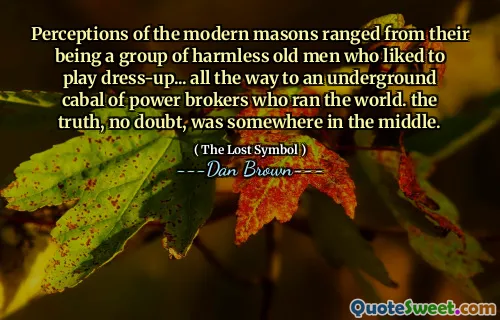The truth will be twisted, Langdon knew. As it always is with the Masons.
In Dan Brown's "The Lost Symbol," the narrative reflects on the elusive nature of truth, particularly in the context of the Masonic order. The protagonist, Robert Langdon, is acutely aware that the Masons often manipulate information to serve their own purposes. This theme underscores the complexity of deciphering reality amidst a web of secrets and hidden agendas. Langdon's insight suggests that uncovering the truth requires vigilance and discernment, as perceptions can be easily distorted. The mention of the Masons implies a longstanding tradition of mystery, where knowledge is carefully guarded and interpretations can vary dramatically. The struggle to obtain clarity in a world filled with half-truths resonates throughout the story, heightening the tension and intrigue.
In Dan Brown's "The Lost Symbol," the narrative reflects on the elusive nature of truth, particularly in the context of the Masonic order. The protagonist, Robert Langdon, is acutely aware that the Masons often manipulate information to serve their own purposes. This theme underscores the complexity of deciphering reality amidst a web of secrets and hidden agendas.
Langdon's insight suggests that uncovering the truth requires vigilance and discernment, as perceptions can be easily distorted. The mention of the Masons implies a longstanding tradition of mystery, where knowledge is carefully guarded and interpretations can vary dramatically. The struggle to obtain clarity in a world filled with half-truths resonates throughout the story, heightening the tension and intrigue.
